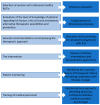Associations between Gut Microbiota Dysbiosis and Other Risk Factors in Women with a History of Urinary Tract Infections
- PMID: 38892685
- PMCID: PMC11174854
- DOI: 10.3390/nu16111753
Associations between Gut Microbiota Dysbiosis and Other Risk Factors in Women with a History of Urinary Tract Infections
Abstract
(1) Background: Urinary tract infections (UTIs) are among otherwise healthy women represent a problem that requires additional understanding and approaches. Evidencing the link between dysbiosis and UTIs and the associated potential risk factors could lead to therapeutic approaches with increased efficiency under the conditions of reducing the risks associated with antibiotic treatments. The purpose of this study was to evaluate dysbiosis and other potential risk factors in women with a history of urinary tract infections; (2) Methods: Fecal dysbiosis tests were performed comparatively in two groups of women. The first group in-cluded women with recurrent urinary tract infections (rUTI) who had either two or more symp-tomatic episodes of UTI in the previous six months. The second group included women with spo-radic UTIs who did not have >1 UTI during a 12-month period and who did not have another UTI in the last 12 months; (3) Results: An association was shown between intestinal dysbiosis and recurrences of urinary tract infections. Increased body weight was associated with intestinal dysbiosis. Also, the lack of knowledge regarding the risk of using antibiotics and the benefits of probiotics was associated with both dysbiosis and recurrences of urinary tract infections; (4) Conclusions: Dysbiosis can have an impact on the recurrence of urinary tract infections. The risk factors for rUTI and dysbiosis in the sphere of lifestyle are potentially controllable, broadening the perspective for new approaches and changing the paradigm in the treatment of urinary tract infections.
Keywords: dysbiosis; risk factors; urinary tract infections.
Conflict of interest statement
The authors declare no conflicts of interest.
Figures
Similar articles
-
Gut Microbiome Implication and Modulation in the Management of Recurrent Urinary Tract Infection.Pathogens. 2024 Nov 21;13(12):1028. doi: 10.3390/pathogens13121028. Pathogens. 2024. PMID: 39770288 Free PMC article. Review.
-
Standardised Chinese herbal treatment delivered by GPs compared with individualised treatment administered by practitioners of Chinese herbal medicine for women with recurrent urinary tract infections (RUTI): study protocol for a randomised controlled trial.Trials. 2016 Jul 27;17:358. doi: 10.1186/s13063-016-1471-5. Trials. 2016. PMID: 27460108 Free PMC article. Clinical Trial.
-
Recurrent urinary tract infections in women: How promising is the use of probiotics?Indian J Med Microbiol. 2017 Jul-Sep;35(3):347-354. doi: 10.4103/ijmm.IJMM_16_292. Indian J Med Microbiol. 2017. PMID: 29063878 Review.
-
Longitudinal multi-omics analyses link gut microbiome dysbiosis with recurrent urinary tract infections in women.Nat Microbiol. 2022 May;7(5):630-639. doi: 10.1038/s41564-022-01107-x. Epub 2022 May 2. Nat Microbiol. 2022. PMID: 35505248 Free PMC article.
-
Management of uncomplicated recurrent urinary tract infections.BJU Int. 2022 Jun;129(6):668-678. doi: 10.1111/bju.15630. Epub 2021 Nov 17. BJU Int. 2022. PMID: 34741796 Review.
Cited by
-
Exploring urinary microbiome: insights into neurogenic bladder and improving management of urinary tract infections.Front Cell Infect Microbiol. 2025 Apr 1;15:1512891. doi: 10.3389/fcimb.2025.1512891. eCollection 2025. Front Cell Infect Microbiol. 2025. PMID: 40235931 Free PMC article. Review.
-
A Perspective on the Interaction Between Recurrent Lower Urinary Tract Infections and Irritable Bowel Syndrome.Nutrients. 2024 Oct 24;16(21):3613. doi: 10.3390/nu16213613. Nutrients. 2024. PMID: 39519446 Free PMC article.
-
Unveiling the microbial orchestra: exploring the role of microbiota in cancer development and treatment.Discov Oncol. 2025 Apr 30;16(1):646. doi: 10.1007/s12672-025-02352-2. Discov Oncol. 2025. PMID: 40304829 Free PMC article. Review.
-
Gut Microbiome Implication and Modulation in the Management of Recurrent Urinary Tract Infection.Pathogens. 2024 Nov 21;13(12):1028. doi: 10.3390/pathogens13121028. Pathogens. 2024. PMID: 39770288 Free PMC article. Review.
References
MeSH terms
Substances
Grants and funding
LinkOut - more resources
Full Text Sources
Medical


